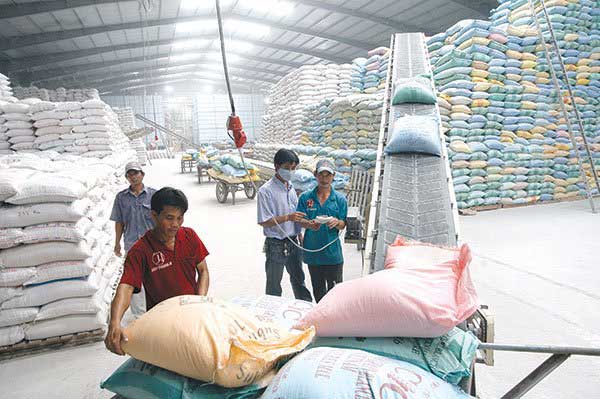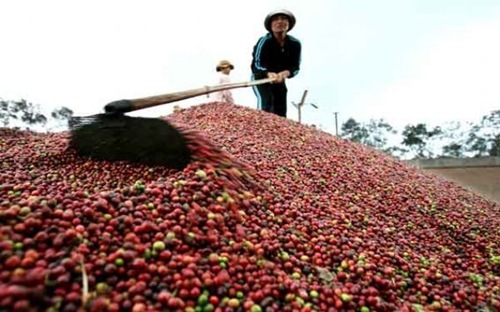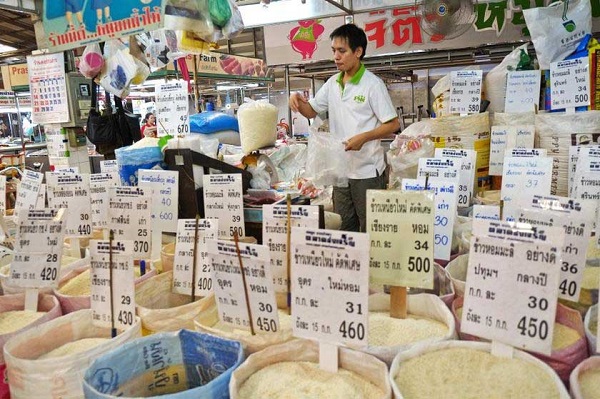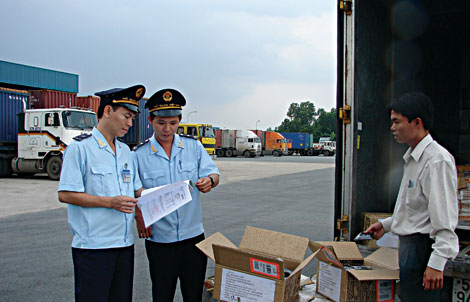Revise policies, create breakthroughs for rice exports
Export (export) rice is facing a lot of difficulties when the supply is excessive, demand is reduced. The draft decree replaces the Decree 109 on rice export business is receiving great attention of businesses and localities, with the expectation of policy mechanism to facilitate export.

According to the Ministry of Industry and Trade, after many years of implementation, Decree No. 109/2010 / ND-CP dated 4 November 2010 of the Government on rice export business (Decree 109) Long-term investment direction. Currently, the number of traders is relatively stable with 150 enterprises (enterprises), capacity of storage, grinding, milling, drying of rice is improved. Traders have also built raw material areas, signed contracts link production, consumption of rice with farmers. However, in the context of rice export is facing many difficulties, the conditions of rice export business stipulated in Decree 109 such as forced storage, grinding, milling … are no longer suitable when many enterprises produce Exporting organic and organic rice in small quantities is difficult to meet. The Decree also exposed many inadequacies in circulation reserves, rice export contracts concentrated; Register rice export contracts; Regulation of floor price; The management and responsibility of the ministries …
Therefore, the draft decree replacing Decree 109 is being amended by the Ministry of Industry and Trade to renovate and improve the institutional framework and legal framework for rice export business and rice export management. The direction of building tectonic, transparent and effective institutions, creating favorable conditions for rice export.
According to the Import-Export Department of the Ministry of Industry and Trade, the draft Decree amending Decree 109 on rice export business has the following remarkable points: traders are not required to own warehouses, grinding or milling facilities. Turn rice, rice. To meet the business conditions, traders can own or rent these facilities to meet the conditions of rice export business. Especially, for the export of organic rice, rice, fortified rice, traders are not required to meet business conditions without issuing a certificate, only to inform the contract. Export to Ministry of Industry and Trade.
The draft also amended some provisions to accelerate administrative reform such as simplification of procedures, dossiers of application for grant, re-issue and adjustment of contents of certificates to traders in the direction of deregulation. To carry out procedures for checking and certifying business conditions of provincial-level Trade and Industry Services. Specifically, traders do not need to carry out procedures to request the Department of Industry and Commerce to check and certify inventory lists, rice husking and grinding facilities; Instead, it is a mechanism for traders to self-disclose information and take responsibility for their commitments to meet business conditions. The Department of Industry and Trade only undertakes post-inspection after the trader has been granted the certificate. At the same time, the provisions of Article 18 on criteria for registration of rice export contracts and Article 19 of the export floor price regulation are removed. Reduce the regulation of the rice reserve of traders from 10% to 5% of the volume of rice traders have exported in the previous six months. Traders are also not required to register rice export contracts at the Vietnam Food Association (VFA) but only informed rice export contracts online on the Portal of the Ministry of Industry and Trade.
The draft also added specific regulations on responsibilities of ministries, branches and localities in rice export management; Mechanism to regulate the price of rice, commodity rice, stabilize the domestic market, develop export markets; Minister of Industry and Trade Tran Tuan Anh emphasized: “The draft decree replacing Decree 109 was developed by the Ministry of Industry and Trade. In the spirit of creating, building and accelerating reform of administrative procedures. The draft has been sent to the Ministry of Justice for comments, then submitted to the Government for approval. During the approval process will continue to review the remaining obstacles to create maximum advantage for businesses.
Rice is one of key export items of our country should draft decree to replace Decree 109 received great attention of business community. Pham Hong Loan, Director of Loan Hung Company (Dong Thap), said that in order for this decree to really benefit the enterprises, it is important to rearrange the rice production process in series, from Selecting, cultivating, purchasing, milling, branding to export.
“When the grain of rice is raised in value thanks to the production chain, enterprises will be active in the export market in accordance with the market. The state only plays the role of strategic planning, regulating the market, providing market information for enterprises, “Pham Hong Loan said.
Commenting on the draft of the Ministry of Industry and Commerce, Pham Thai Binh, Director of Trung An Agriculture Agriculture Joint Stock Company, said that the removal of the export floor price would help promote more open and active rice export. At the same time, the enterprise announced the rice export contract on the Portal of the Ministry of Industry and Commerce is perfectly appropriate, by the Ministry of Industry and Commerce is the Ministry of rice export management, licensing for enterprises should be informed on the portal. The death will facilitate the gathering of information on rice export, help businesses reduce the time, costs of registration and especially not leak information about their contracts.
Mr. Lam Tuan Anh, Director of Thinh Phat Co., further commented, the conditions of export stipulated in Decree 109 should be directed to the quality regulations for each type of rice under a set of standards attached to the brand. Because rice quality is an important factor in determining the competitiveness of exporters nowadays. On the other hand, it is advisable for small businesses to export their own high-quality rice in small volumes so that they can explore difficult markets and niche markets. The state should play a role in providing market information, forecasting rice prices and accessing overseas distribution systems.
(According to nhandan.com.vn)




